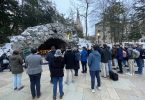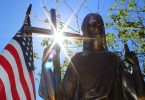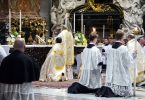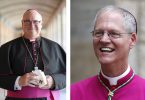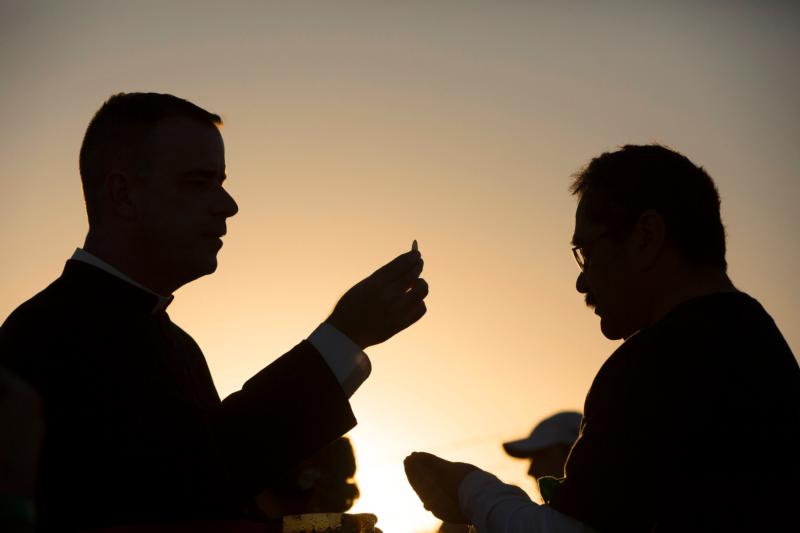
Msgr. J. Brian Bransfield gives Communion to a man attending Mass on the U.S. side of the border in El Paso, Texas, Feb. 17. About 550 guests situated on a levee north of the Rio Grande participated in the Mass Pope Francis celebrated in Ciudad Juarez, Mexico. Msgr. Bransfield is general secretary of the U.S. Conference of Catholic Bishops. (CNS photo/Nancy Wiechec)
by Catholic News Service
EL PASO, Texas (CNS) — A group of people, mostly migrants, joined Pope Francis from afar as he celebrated Mass that closed his visit to Mexico.
Gathered less than a football field length from the altar where the pope prayed Feb. 17 in Cuidad Juarez, across the border in Mexico, the group of about 550 people cheered as they welcomed the pope to their community, knowing he understood the reason people migrate from their homelands in search of a better life.
The Diocese of El Paso called them “Pope Francis VIPs” — to underline the pope’s message of mercy and his closeness to the poor and migrants.
Pope Francis acknowledged their presence with a wave and a blessing as they assembled on a levee on the U.S. side of the border.
About 100 of the Pope Francis VIPs were unaccompanied minors who were detained by U.S. immigration officers and live in three shelters in El Paso.
In addition to the VIPs, U.S. bishops, pastors, religious sisters, social workers and others who have been helping migrants and poor people along the border were on the levee.
Ernesto Tapia, a program director at Southwest Key Programs, which runs several shelters throughout Texas, brought one group of teens from his shelter to the levee. “Faith is such a big part of the kids’ journey,” he said, “and seeing the pope today is the ultimate experience for them. It gives them hope.”
One of the minors, a 17-year-old girl, who could not give her a name, said she had many problems in Tijuana, Mexico, before she came to the U.S., and that friends had been shot by gangs.
Arturo Chavez, president of the Mexican American Catholic College in San Antonio, said while waiting for the pope’s arrival that the journey that migrants make “searching for a better place” is often on his mind.
“We are here in the presence of unaccompanied minors who have been invited to be here. I feel humbled to be a part of this historic moment. The excitement is palpable,” Chavez said.
He said that he had learned that the initial plan had been to extend the pope’s platform across the river into the United States, but that it had not been possible. “To me that was a very significant and powerful symbol: that even the pope can’t cross this border. He can only go this far,” he said.
“We need to find a way to bridge these two nations,” Chavez added. “We share one faith. I’m excited that the pope cares enough about this whole situation to come all this way and to be with us today, so my hope is that his compassion, his love, his mercy will inspire us to do the same and to do our part.”
Sister Carolyn Kosub, a Missionary Sister of the Immaculate Heart of Mary, traveled to El Paso from the impoverished border town of Penitas, Texas, in the Diocese of Brownsville, where she and two other women religious have dedicated their lives to ministering to poor migrants. “We came here today,” she said, “representing the immigrant people in our colonia.”
She said she was moved by Pope Francis’ call to conversion in his homily.
“The Holy Father told us in his homily that we cannot continue to live the way we have been living, he called us to transform our lives. We cannot continue to exploit people, to deny them their human dignity. I think it’s a very powerful message, a message that the whole world should ponder,” Sister Carolyn said.
Asked what message she would bring back to her community, she said, “I am going to tell them that the Holy Father has walked where they have walked, that he understands their lives and their dreams, and that he believes as much in them as they believe in him. Also that there’s a brighter future that awaits them and that they have so many people on their side, including the pope. Their life is a hard struggle, but it’s worth it. And that they can continue in their faith and that they are not alone.”
Joe Boland, vice president of mission for Catholic Extension, which helped the Diocese of El Paso organize events on the U.S. side of the border, called the day extraordinary and historic. “It was extraordinary especially for the people to whom Pope Francis’ heart went out and who his prayer was for today,” he said.
“They are the ones who need access to the pope the most, the people who have been victims of crimes, the people who are in detention as children, the people who are powerless and voiceless,” Boland said. “Through this event, they could see their pope, this global figure, come here and offer a prayer and a message on their behalf, and that was very powerful. They heard the pope stand with them, stand in their shoes, and in this Jubilee Year of Mercy press his utter solidarity with the poor.”
At Catholic Extension, he added, “we’re so blessed and honored to have been part of it.”
Based in Chicago, Catholic Extension is a papal society that supports under-resourced dioceses in the United States. It has been a partner to the Diocese of El Paso for the organization’s entire 110-year history and has provided assistance to the U.S. dioceses along the border totaling more than $122 million in today’s money.
Several U.S. prelates — including Cardinal Roger M. Mahony, retired archbishop of Los Angeles; Archbishop Joseph E. Kurtz of Louisville, Kentucky, president of the U.S. Conference of Catholic Bishops; Archbishop John C. Wester of Santa Fe, New Mexico; Bishop Gerald R. Barnes of San Bernardino, California; and Auxiliary Bishop Eusebio L. Elizondo of Seattle, chairman of the bishops’ migration committee — distributed Communion to the people gathered on the levee. Msgr. J. Brian Bransfield, USCCB general secretary, also distributed Communion.
Cardinal Mahony called the pope’s presence at the border a powerful sign.
“He’s really showing us the unity among peoples, that in God’s kingdom there are not border or barriers or walls,” the cardinal said. “His presence here is a powerful sign that the unity of all peoples is the ultimate path to peace in the world. . . . It isn’t arms, it’s not bombing people, it’s as he calls, encounter and dialogue.”
Cardinal Mahony said he had the opportunity to go to Cuidad Juarez to celebrate Mass with the pope, but that he chose to be on the U.S. side of the border.
Before the Mass, the cardinal spent time with young men wearing bright orange shirts with a Pope Francis motif. They are minors who arrived in the U.S. undocumented and “unaccompanied,” meaning without parents or guardians.
“I wanted to be on here on this side because most of these people can’t go to the other side,” he said. “I have hope and longing that some day it will be a lot easier for us to be brothers and sisters across borders.”

